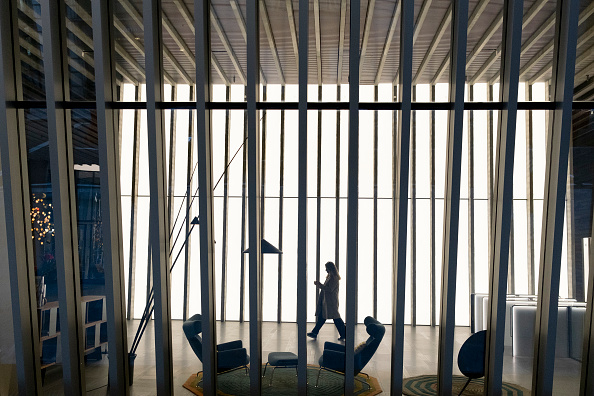Privacy, please. Demand for phone booths is a sign the open-plan working craze is over

Collaborative space in offices has been in vogue for some time now. The demand for open plan offices was behind the creation of thousands of co-working companies.
You’ve heard the phrases: bumping into colleagues, water cooler chats, office banter – all the things we missed in the office. But whether people are in the office two days a week or five, something fundamental has changed in how we use that space.
One of the most desired features in offices now is phone booths, and those thinking about office design should take note. Humans are sociable creatures, but we also like privacy, and office design has been eating away at workers’ privacy for years.
Advances in technology have meant that the equipment we have on our desk has got smaller: there’s no need for big desktop computers when you can use laptops and cloud computing. But rather than relishing the extra space, desks have shrunk in size too, a phenomenon accelerated by the advent of break out areas and “collaborative space”.
It is particularly acute in the flexible workspace sector, where operators have found it difficult to monetise shared spaces, so they squeezed in more desks, allocating less space per person to compensate.
We’ve all seen those offices with amazing receptions and communal areas with café-bars, sofas and table football but look beyond the public spaces to where the regular desks are, and it’s a different picture.
For two years, people were used to the privacy of their own home. Or they were bombarded with how little privacy they had, with kids and pets and other distractions.
Designing offices to suit a tried and tested model of working is perceived as less risky.
It’s a balancing act. Offices need free-flowing space to allow collaboration to flourish and for staff to feel part of something. But it can’t be at the cost of personal space, staff also need to be able to retreat to quieter spaces with more privacy.
Hence the demand for phone booths.
For those with offices or co-working spaces to let, it means listening to those who will be using the space. Workers have more choice. There are more job options, more ways of working and more places to work.
It’s true, people want space to work with others when they are in the office. But for many, they also need privacy. And especially in cities like London, this is a luxury not available for many, even in their own homes.
Occupier voices are louder than ever simply because people can vote with their feet. If staff don’t like the work environment, they can move jobs.
Why would they commute for two hours a day to sit at a cramped desk where they can be overheard or where it’s too noisy to concentrate?
Businesses have a greater choice too. Twenty years ago, you could look at ten buildings in the same street, and while the facades might be different, the floorplates and finishes would essentially be the same. It wasn’t so much about what the space was like but negotiating the best possible deal.
But those days are gone. The industry has less power to dictate what office space should be like. Businesses are looking at how offices contribute to productivity and staff retention, not just what it costs.
Understanding how people work and their needs must inform offices to a far greater degree than it has in the past. Collaboration space is important and needs to be carefully curated, but the rest of the office design needs equal consideration.
For all the latest Lifestyle News Click Here
For the latest news and updates, follow us on Google News.

